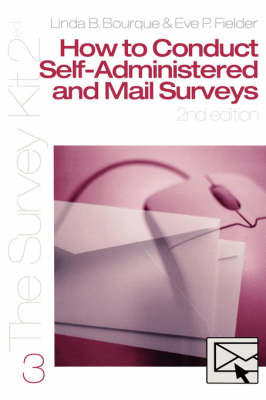
How to Conduct Self-Administered and Mail Surveys
SAGE Publications Inc (Verlag)
978-0-7619-2562-0 (ISBN)
"The authors discuss self-administered questionnaires, the content and format of the questionnaire, "user-friendly" questionnaires and response categories, and survey implementation. They offer excellent checklists for deciding whether or not to use a mail questionnaire, for constructing questions and response categories, for minimizing bias, for writing questionnaire specifications, for formatting and finalizing questionnaires, and for motivating respondents and writing cover letters."
--Peter Hernon, Graduate School of Library and Information Science, Simmons College
How do you decide whether a self-administered questionnaire is appropriate for your research question? This book provides readers with an answer to this question while giving them all the basic tools needed for conducting a self-administered or mail survey. Updated to include data from the 2000 Census, the authors show how to develop questions and format a user-friendly questionnaire; pretest, pilot test, and revise questionnaires; and write advance and cover letters that help motivate and increase response rates. They describe how to track and time follow-ups to non-respondents; estimate personnel requirements; and determine the costs of a self-administered or mailed survey. They also demonstrate how to process, edit, and code questionnaires; keep records; fully document how the questionnaire was developed and administered; and how the data collected is related to the questionnaire. New to this edition is expanded coverage on Web-based questionnaires, and literacy and language issues.
Linda Bourque, PhD, is a Professor in the Department of Community Health Sciences and an associate director of both the Center for Public Health and Disasters and the Southern California Injury Prevention Research Center in the UCLA School of Public Health. Trained as a sociologist, she teaches courses on research design with an emphasis on the design, data processing, and data analysis of questionnaires and community-based surveys. Her research during the last twenty years has focused on community response to disasters. A public website contains all of the raw data, codebooks, questionnaires, publications and related material from surveys conducted on California earthquakes since 1971 by Leo Reeder, Ralph Turner, Dennis Mileti and Linda Bourque. Current research includes the National Survey of Disaster Experiences and Preparedness (NSDEP), and the California Survey of Earthquake Preparedness. Funded by the Department of Homeland Security and the National Science Foundation, NSDEP examines the factors that predict disaster preparedness and risk avoidant behavior, with an emphasis on terrorism. A stratified sample of 3,300 households was selected using random digit dialing: 1,000 households were selected for interview in areas considered at high risk of terrorism (Washington, D.C., New York City, Los Angeles County), and 2,300 households were selected for interview throughout the rest of the continental United States. Respondents were asked whether they had invested in six preparedness behaviors and seven risk avoidant behaviors either because of terrorism, natural disasters, other reasons, or any combination of the three. NSDEP reports and other documentation are available here. Eve Picardy Fielder died on Oct. 27 at home in Venice, CA, after a long illness. She was 67. An academic researcher, she received her doctorate in public health from UCLA, where she was the director of the Survey Research Center. Many of the hundreds of survey research projects she managed focused on public policies related to social issues and service delivery in the areas of health and welfare. She also conducted research of her own on issues of relevance to the Hispanic/Latino communities
| Erscheint lt. Verlag | 14.1.2003 |
|---|---|
| Verlagsort | Thousand Oaks |
| Sprache | englisch |
| Maße | 152 x 228 mm |
| Gewicht | 370 g |
| Themenwelt | Informatik ► Datenbanken ► Data Warehouse / Data Mining |
| ISBN-10 | 0-7619-2562-7 / 0761925627 |
| ISBN-13 | 978-0-7619-2562-0 / 9780761925620 |
| Zustand | Neuware |
| Haben Sie eine Frage zum Produkt? |
aus dem Bereich


